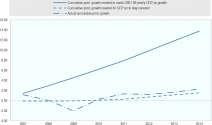I don't like using the USSR as an example for anything because it's an economic failure. With that out of the way, let's take a look at "then what?"The shift from agricultural to industrial employment isn't exactly unique to China, it happened in the USSR and before that in western countries during the industrial revolution. The problem with it is that it's a one off economic boost. Once the agricultural workforce is less than 5% then what?
I claimed that there's already a 280 million person population in China who are economically useless. Let's net them out of the population of 1.4 billion and divide the 2022 PPP adjusted GDP of China among the remainder to get an upper bound on what China's level of development would be if the labour composition were optimum. The answer is $26,800. By comparison, the OECD average PPP adjusted per capita GDP is $50,000. The answer to "then what?" should be clearer now. What then is productivity goes up and keeps going up. Demographers and people who subscribe to their doom-and-gloom should understand that productivity can grow without bound.
Automation isn't a binary state, it doesn't stop just because it didn't reach a level you expected in 1980s Japan. Automation is like the sea levels rising due to climate change, a gradual inexorable process that will eventually drown cities.
But that's not all, let's examine another dimension. The demographer defines "labour force" as people aged 16-64, as if all that determines their productivity and economic utility is age. It's some constant within that range and zero outside it. But the thing to note here is that not all work is created equal. The unfortunate Farmer Zhang of my example probably doesn't want to and can't continue working past 64, but a STEM worker in comfortable desk job certainly can, as can a "miner" sitting in an air-conditioned room controlling a 500 ton digger in real-time through a 5G connection (technology available in China today).
It gets even better. 64 is given as a magic number at which human beings reach a certain level of decrepitude where they're no longer able to work. You casually mentioned lab-grown meat as an alternative for resource intensive farming; do you understand the implications of that? Do you know what it would mean for medicine if tissue could be synthesized in bioreactors cheaply enough to use as food? Medicine would be completely revolutionized - people would be able to replace failing organs as easily as they replace car parts. Living well past 100 in an excellent state of health (not "excellent for your age") would be the norm. How would "labour force" be defined then?
I'll have to bust out the equation againBeing dependent on that for economic growth is creating a problem for future generations.
GDP = size of labour force * productivity.
Being dependent on the factor that can grow without bound is a problem because?

